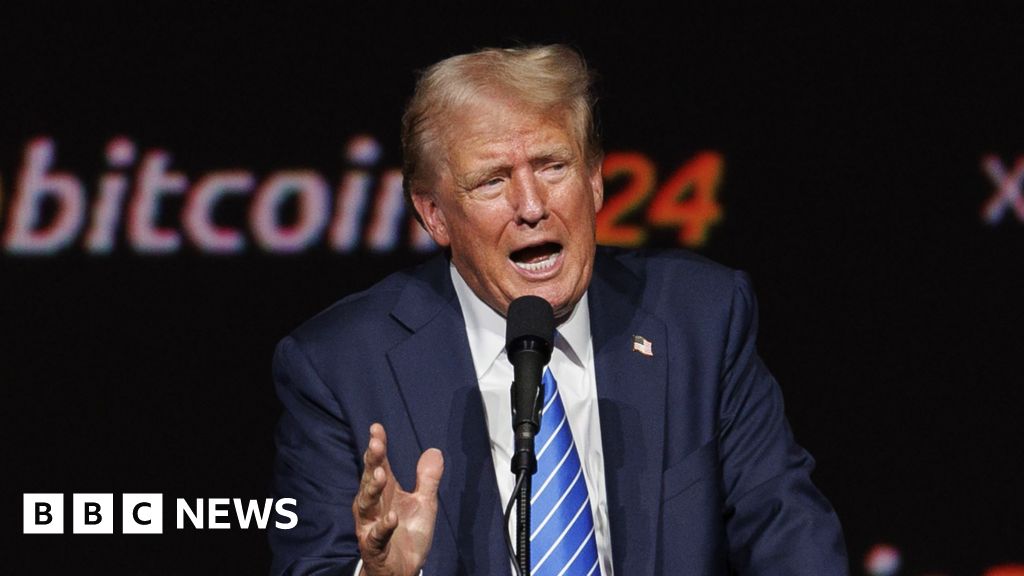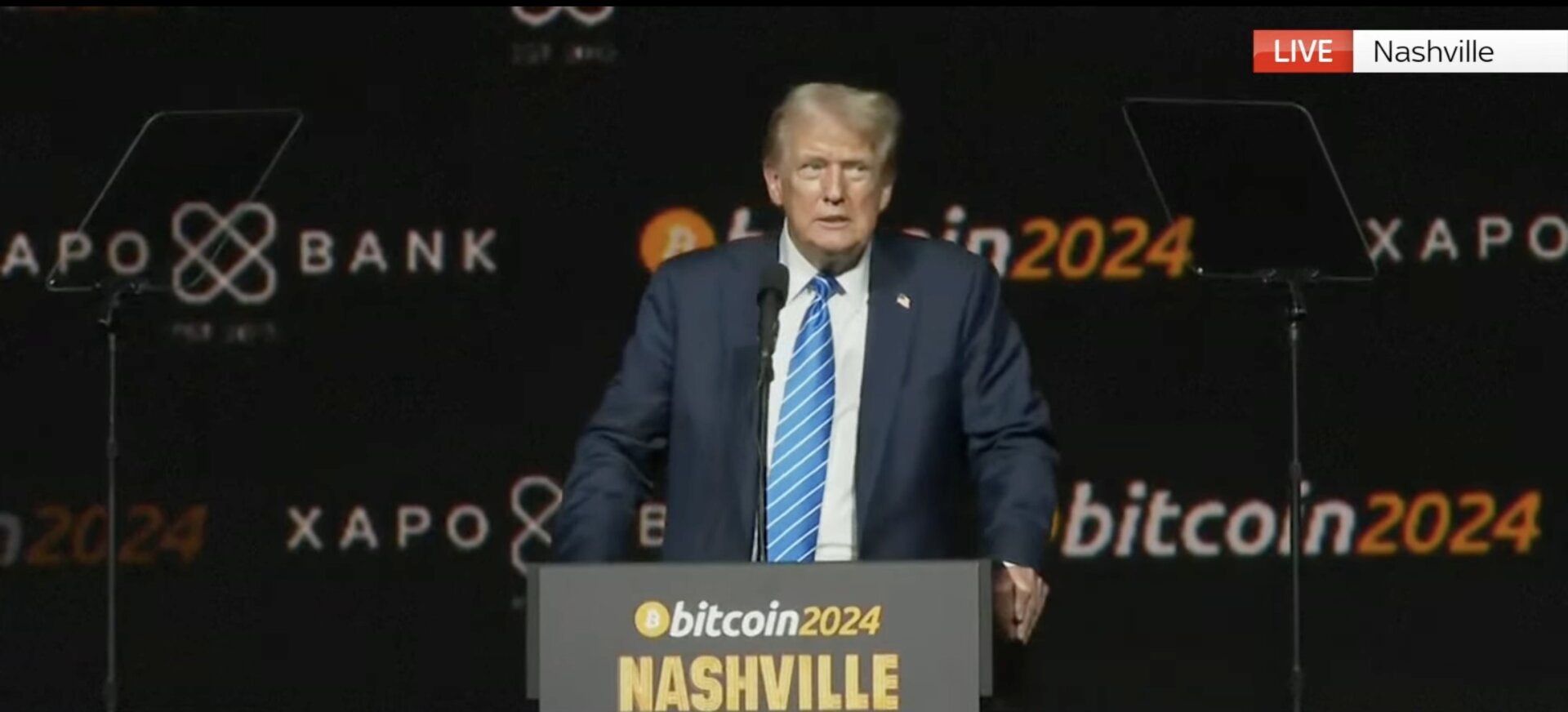Tech
The Latest Tech News in Crypto and Blockchain

Jan. 17: Unstoppable Domains, in partnership with Push Protocol, a pioneer in decentralized communication, announced the launch of a “token-gated Group Chat for Unstoppable Messaging,” according to the team. “By limiting access to specific communities based on verifiable blockchain records and tokens, Group Chat aims to eliminate the spread of misinformation and scams such as phishing, spam bots, project impersonation and social engineering-based attacks.”
Protocol Village is a regular feature of The Protocol, our weekly newsletter exploring the tech behind crypto, one block at a time. Sign up here to get it in your inbox every Wednesday. Project teams can submit updates here. For previous versions of Protocol Village, please go here. Also please check out our weekly The Protocol podcast.
Partisia Blockchain Launches Digital Asset Custody Product at Davos
Jan. 17: On stage during his keynote address at a Davos side event, Brian Gallagher, co-founder of Partisia, a layer-1 blockchain oriented around multiparty computation (MPC) and zero-knowledge proofs, introduced a custody product, according to the team: “Gallagher highlighted that unlike current custody offerings from existing providers, the new solution is decentralized, open source and available for all. ‘The industry is becoming more regulated, necessitating institutional-grade, blockchain-agnostic custody solutions.’” According to a press release, the new product is called MOCCA, for MPC On-Chain Custody Advanced solution.
Space and Time Introduces ‘Python Data Jobs’ as Coding-Free Solution
Jan. 17: Space and Time, which describes itself as “the verifiable compute layer for Web3,” has introduced “Python Data Jobs.” According to the team, the new offering “tackles Web3 limitations, offering a coding-free solution for long-running Python tasks. Building on prior achievements, it enables Python usage for data tasks, with Houston, the AI chatbot, facilitating quick data migration. The program, in beta, aims to enhance real-time security with a ZK proof for Python, streamlining database migrations and empowering DeFi calculations in Web3.”
ICP Upgrades Canisters to 400GB, Allowing Bitfinity’s Bitcoin L2 to Run Inside Smart Contract
Jan. 17: The Dfinity Foundation announced that enhancements to ICP’s canister smart contracts now allow for each canister to hold 400GB of data. According to the team: “With this upgrade, the Internet Computer is further setting itself apart as a decentralized cloud rather than another L1 blockchain. The advancement will allow Bitfinity, a Bitcoin layer-2 network based on the ICP, to run its Bitcoin L2 entirely inside of a smart contract. At only $5/year for 1GB of storage, ICP is orders of magnitude cheaper than other L1 blockchains and allows for this type of development to occur on-chain.”
Solana Foundation Releases Hacker House Dates, Starting With New York in March
Jan. 16: The Solana Foundation has announced the 2024 Hacker House schedule. According to the team: “These two-day events will serve as an opportunity for the community to gather in person to build, foster, and strengthen the diverse Solana community. The content at each Hacker House will focus on themes like DeFi, regulation, and stablecoins, designed to target specific areas of interest relevant to the current market.” The 2024 schedule:
-
Bengaluru, India: July 26-27
Gather Network to Rebrand as Hydro, Migrate Onto Sui
Jan. 17: The Gather Network announced its transformation into Hydro Online, “marking a pivotal step forward in its mission to create a dynamic ecosystem that caters to the diverse needs of its publishers. The shift is not just a change of name but a return to the platform’s core values and primary functions. These changes are designed to provide more focus, security, and efficiency in creating value for publishers and their users.” According to the team, Gather has had, and will have until the new TGE (token generation event), “its own layer 1 blockchain on which it operated. From this technical setup, we are migrating to the SUI blockchain.” (SUI)
CryoDAO, Dedicated to Cryopreservation Research, Raises $2.8M on Juicebox Platform
Jan. 17: CryoDAO, which says it aims to “solve death” through cryopreservation research, has raised about $2.8M (1,108 ETH) on the fundraising and treasury protocol Juicebox. According to the team: “CryoDAO’s objective is to contribute to cryopreservation research projects that have a high potential to increase the quality and capabilities of cryopreservation.” The project’s page on Juicebox reads: “The $CRYO token is a governance token that enables you to vote for governance proposals within CryoDAO, and is not intended to constitute securities or financial instruments in any jurisdiction.”
Metis Launches Community Testing of Proof-of-Stake Sequencer Pool
Jan. 16: Metis, an Ethereum layer-2 network, has launched “community testing for their Proof-of-Stake Sequencer Pool on the Metis Sepolia Testnet before its official launch on the mainnet later in 2024,” according to the team: “Metis Proof-of-Stake Sequencer Pool will offer 24/7 liveness, enhanced censorship resistance, enhanced security, and fee sharing. Already announced dApps include League.Tech, Tethys Finance, Midas Games, Netswap and Hummus Finance.”
Massa Mainnet Now Live, Supports Autonomous Smart Contracts and Staking
Jan. 16: Massa Labs launched the decentralized proof-of-stake blockchain network Massa on Jan. 15, following a lengthy period of development and testing, according to the team: “This event signifies the beginning of a new state-of-the-art blockchain network that offers robust architecture and brings brand new features to decentralized finance, like Autonomous Smart Contracts and on-chain web.” From Massa’s documentation: “Instead of one chain, there are exactly 32 threads of chains running in parallel, with blocks equally spread on each thread over time, and stored inside slots that are spaced at fixed time intervals.”
Filecoin Foundation Sends IPFS to Space With Lockheed Martin-Developed Software
Jan. 16: Filecoin Foundation (FF) successfully completed a first-of-its-kind mission deploying the InterPlanetary File System (IPFS) in space, according to the team: “The recent demonstration involved sending files from Earth to orbit and back using an implementation of the IPFS protocol designed for space communications. This mission, conducted with Lockheed Martin-developed software, demonstrated how IPFS – a decentralized content distribution system – can bring the benefits of decentralized technologies to space to enable better communications across long distances and resilience in challenging environments.” (FIL)
Upshot, Decentralized AI Platform, Announces Beta Launch of ‘RoboNet’ for Vault Management
Jan. 16: Upshot, a decentralized AI platform, announced the beta launch of its AI-powered vault platform RoboNet. According to the team: “RoboNet will allow capital providers to deposit into vaults managed by AI-powered strategies. This gives people access to much more advanced DeFi strategies by leveraging AI, going beyond what was previously achievable with traditional onchain yield-generating strategies. Previously, the requirements for successful market making were complex and resource-intensive. RoboNet automates this process, predicting long-tail asset prices and driving liquidity to long-tail assets.”
Chainlink Teams Up With Circle to Allow Cross-Chain Stablecoin Transfers
Jan. 16: Chainlink’s Cross-Chain Interoperability Protocol (CCIP) has integrated Circle’s Cross-Chain Transfer Protocol (CCTP) to make it easy for users to transfer USDC across chains, according to a press release. Developers can now build cross-chain use cases via CCIP that involve cross-chain transfers of USDC, including payments and other DeFi interactions, the statement said. (LINK)
Marblex Expands Multi-Chain WARP Service to Aptos
Jan. 16: Marblex announced the expansion of its multi-chain WARP service to now include the layer-1 blockchain Aptos, according to the team: “Aptos’s breakthrough technology and programming language, Move, are designed to evolve, improve performance and strengthen user safeguards. This update establishes a connection between the ecosystems of Aptos and MBX, enabling Aptos users to seamlessly access MBX services such as games and NFTs within its own ecosystem.” (APT)
Hedera Creates MetaMask Wallet Snap, Achieving EVM Interoperability
Jan. 16: Hedera has collaborated with MetaMask to create the Hedera Wallet Snap, connecting the Hedera network with MetaMask’s 30 million monthly active users, according to the team: “The newly launched plugin will enable Hedera to achieve full EVM interoperability. Users can now send HBAR to both Hedera and EVM addresses, as well as retrieve their account information and easily view their token balances. MetaMask users can enhance the capabilities of their applications beyond the native features of MetaMask, leveraging Hedera’s wide portfolio of Web3 tools, including smart contract development and tokenization services.” (HBAR)
Bitfinex Partners With Synonym to Allow Purchases of Lightning Network Connections
Jan. 16: Bitfinex, the digital asset trading platform, “has partnered with Synonym to introduce a feature that allows customers to buy Lightning Network connections for instant deposit, withdrawals and payments,” according to the team: “Bitfinex customers can now connect directly to the nodes, eliminating the need for the previously cumbersome process of withdrawing balances, selecting peers, and manually opening channels. This feature removes the necessity to search for external Lightning Service Providers or listings on liquidity marketplaces, providing users with seamless access to substantial receiving capacity.”
Cronos Labs’ Third Web3 Accelerator Cohort Includes Lillius, Innerworks
Jan. 16: Cronos Labs announces its third Web3 Accelerator cohort, blending AI and blockchain for groundbreaking innovation. With a 57% surge in applications, five pioneering projects receive mentorship and $30,000 seed funding each. The projects are:
The program, backed by AWS, Google Cloud and more than 100 mentors, will conduct a Demo Day in April, where the projects will have the opportunity to pitch their ideas to the program’s key investment partners which include NGC, Fundamental Labs, Republic, Animoca and Delphi Digital.
WalletConnect Launches ‘Web3Inbox’ for Communication With Apps
Jan. 16: WalletConnect today announced the launch of the Web3Inbox application, “a new easy-to-use consumer product that provides both users and apps an essential communication point, flexible to the demands and needs of today’s world,” according to the team: “The platform gives users of any wallet an all-in-one inbox to subscribe and interact with updates from the apps they love, enabling a headache-free, Web3-first notification experience that keeps them in control. The app launch follows the rollout of the Notify API for Wallets and app developer toolkit, Web3Inbox SDK.”
Hitachi to Create Proof-of-Concepts for Supply Chain Solutions on Hedera
Jan. 16: The Hedera Council announced its newest member, Hitachi America, Ltd. (Hitachi), which brings with it industrial solutions expertise. According to the team: “Hitachi offers a broad range of electronics, power and industrial equipment and services, energy, industrial, health care, IT, OT, mobility and IoT with operations throughout the Americas directly and through its subsidiaries. Hitachi aims to begin creating proof-of-concepts for end-to-end supply chain and sustainability solutions on Hedera in the next year.” (HBAR)
Hacken Introduces Open-Source Rust Library for Code Coverage Generation for WASM Protocols
Jan. 16: Hacken, a blockchain security auditor, has introduced an open-source Rust library for code coverage generation for WASM-based protocols, according to the team: “Code Coverage utilities are crucial for automation testing to ascertain the thoroughness of code examination. Without it, some critical components can remain untested. While it is available for Ethereum-based projects, WASM-based protocols don’t have it. Wasmcov by Hacken is already integrated into the Radix ecosystem, which enables all Radix-built projects to utilize code coverage measurement. The next protocol to get it will be NEAR. The rest can set it up manually.”
D8X, Decentralized Derivatives Exchange, Launches on Polygon zkEVM
Jan. 16: D8X, an institutional-grade DEX for derivatives, has launched on Polygon zkEVM, bringing new trading features to DeFi, according to the team. “With support from Polygon, Axelar, Swissborg and others, D8X reconceives on-chain derivatives, starting from fundamental financial engineering and extending to its novel white-label business-to-business model–a first for Polygon zkEVM. The DEX aims to attract institutional players with features such as cost-efficient hedging; linear, inverse and quanto perpetuals; and yield-bearing pools in Euro, USDC and stETH.”
Renzo, Interface for Restaking Protocol EigenLayer, Raises $3.2M
Jan. 15: Renzo, an interface for the liquid restaking protocol EigenLayer, has raised $3.2M, according to the team: “Maven11 led the Renzo seed round which also saw follow-on investments from Figment Capital, SevenX, IOSG and Paper Ventures. More than 2,000 users have deposited $20M of ETH into Renzo since its protocol was deployed in late December. Renzo uses a combination of smart contracts and operator nodes to supply automated liquid restaking strategies and enables ETH and Liquid Staking Tokens (LSTs) to be restaked and utilized as DeFi collateral to earn compounding rewards.”
Taiko Unveils ‘Katla’ Testnet with Multi-Proofs, Paving Way for Mainnet Launch
Jan. 15: Taiko, developing a so-called type-1 zkEVM to help scale the Ethereum blockchain, announced the launch of “Katla,” its alpha-6 testnet, according to a message from the team: “Katla is laying the foundation for Taiko’s mainnet launch in 2024, marking a significant step forward for the project. It will very likely be the last testnet before Taiko’s mainnet launch in 2024. It will be testing the innovative Based Contestable Rollup (BCR) design, which blends the advantages of optimistic rollups, such as simplicity and low cost, with those of ZK rollups, known for their security and shorter time-to-finality.” According to a press release: “Taiko does not have a centralized sequencer and instead relies on Ethereum block builders for transaction sequencing.”
Lagrange Labs Builds a Light Client for Mantle Network
Jan. 15: Lagrange Labs, developer of a blockchain proving system based on zero-knowledge cryptography, has integrated its light client protocol, Lagrange State Committees (LSC), for the Ethereum layer-2 network Mantle, according to the team. LSCs “are a ZK light client protocol for optimistic rollups (ORUs), designed through combining Lagrange’s ZK MapReduce Coprocessor and EigenLayer restaking. Each state committee borrows security from Ethereum by dual staking, both through EigenLayer restaking and with the rollup’s native token. Augmenting developer experience and cryptoeconomic security on Mantle Network, the LSC is deployed as a core primitive to enable trustless and efficient cross-chain access to Mantle.”
Push Protocol Says Hackathon Participant Found Way to Quantum-Proof Ethereum
Jan. 15 (PROTOCOL VILLAGE EXCLUSIVE): Push Protocol, the communication protocol of Web3, recently concluded their Billion Reasons to Build (BRB) developer tour in India, according to the team: “During the hackathon, Aditya Bisht successfully solved one of its hardest coding challenges belonging to the Ethereum Foundation – quantum proofing the Ethereum Network. Bisht’s creation of an account abstraction smart contract effectively conceals public keys, enhancing the network’s defense against quantum decryption. Building on this success, Push Protocol decided to expand their tour globally as BRB Online and offer ongoing coding challenges to developers.”
Hedera, Algorand, Swirlds Form ‘DeRec Alliance’ for ‘Decentralized Recovery’ Standards
Jan. 15: The Hedera and Algorand ecosystems have joined to Form DeRec Alliance. (DeRec stands for “decentralized recovery.”) According to the team: “Entities from across the Hedera and Algorand ecosystems including the HBAR Foundation, Algorand Foundation, Hashgraph Association, Swirlds Labs, and DLT Science Foundation, along with industry partners The Building Blocks and BankSocial, are partnering to develop a new interoperability recovery standard which will simplify the recovery & adoption of crypto and other assets. The DeRec Alliance will bring together the Web3 ecosystem to offer an open-source, industry-standard methodology making digital asset recovery painless & secure across wallets.”
BitCountry to Introduce ‘BitAvatar’ for Digital ID
Jan. 15: BitCountry, a Polkadot parachain project, launched InnoVoy Event to introduce BitAvatar before their L1 MNet Continuum, according to the team. “BitAvatar, part of MNet’s enriched layer, offers a Universal Avatar identity with NFT-bound wallet, enhancing Web3 experiences. The first 1,000 users can free-mint BitAvatar IDs, with subsequent access via invite codes. This is a significant step in digital ID evolution in blockchain, with personalized avatars and exclusive benefits for MNet’s ecosystem projects. The BitCountry Team aims to simplify blockchain accessibility and understanding through this innovative technology.” MNet is a “scaled EVM and WASM network with an Enriched Social Layer,” according to a blog post. (DOT)
Google Cloud Joins Flare Network as Validator
Jan. 15: The cloud division of tech giant Google (GOOGL) has joined the Flare blockchain as a validator and infrastructure provider. Google Cloud is one of 100 organizations adopting this combined role, both securing the network as a validator and contributing to the Flare Time Series Oracle (FTSO), according to an announcement shared with CoinDesk on Monday.
Injective ‘Volan’ Upgrade Introduces Real World Asset Module
Jan. 11: Injective, a finance-focused Web3 blockchain, launched the Volan chain upgrade, its biggest protocol update to date, which will introduce the Real World Asset (RWA) Module. According to the team: “Injective’s new RWA Module offers a groundbreaking approach to creating and managing permissioned assets with extensive customization options. This module enables both institutions and individual users to easily launch and access a variety of structured products and RWAs such as fiat pairs, treasury bills, and exclusive credit products, accessible through compliant gateways.” (INJ)
DePIN and DeWi Come to Sui Through Partnership with Karrier One
Jan. 11: Sui, a layer-1 blockchain, is getting DePIN and DeWi through a groundbreaking partnership with Karrier One, according to the team: “The deal also includes strategic investment from Sui to fuel the expansion of Karrier One’s global footprint and deployment on Sui. The technical integration will feature DePIN services powered by the Sui blockchain and the launch of a Karrier One Decentralized Wireless (DeWi) network token on Sui. In addition, contributors to and participants in the Karrier One ecosystem will be able to earn DeWi tokens for various activities such as deploying radios and mobile usage involving Karrier One phone numbers.”
Union Partners With Movement, Noble for USDC Support Across Celestia
Jan. 11: Union Labs, a sovereign interoperability layer, has partnered with modular blockchain network Movement Labs and the Cosmos-based asset-issuance appchain Noble to transport native USDC and other assets across Celestia’s modular stack. According to the team: “Union’s zero-knowledge IBC bridge facilitates a seamless flow of liquidity across Movement rollups, the broader Cosmos ecosystem and Celestia’s sovereign rollups, as well as allowing for general message passing and asset transfers on Movement.”
Open Dollar, Arbitrum Lending Protocol, Innovates ‘Non-Fungible Vaults’ or NFVs
Jan. 11: Open Dollar (OD), an Arbitrum lending protocol, will airdrop 78k+ tokens to qualifying wallets on January 17, approximately three weeks before the lending protocol goes live on Arbitrum Mainnet. According to the team: “Open Dollar is a lovechild of DeFi and NFTs, innovating a concept called Non-Fungible Vaults (NFVs) which enables tradable loans as NFTs, with a focus on liquid staking tokens and Arbitrum native assets, so users earn their staking rewards while they trade. Three percent of the total token supply, 300,000 Open Dollar Governance tokens, will be airdropped to qualifying users.”
Bitfinity Has Secured $7M From Backers Including Polychain, ParaFi
Jan. 11: Bitfinity Network, a Web3 infrastructure firm, on Thursday announced it has successfully secured over $7 million in funding from notable backers, including Polychain Capital and ParaFi Capital, advancing its mission to establish off-chain infrastructure for Bitcoin and Ordinals. According to the team: “The raise coincides with the development of the Bitfinity Ethereum Virtual Machine (EVM) – a Bitcoin sidechain integrated into the Internet Computer blockchain that enables solidity developers and existing EVM-compatible services to build Bitcoin-enabled decentralized apps (dApps).”
Ethereum’s Vitalik Buterin Proposes Gas Limit Increase
Jan. 11: Ethereum co-founder Vitalik Buterin suggested raising the network’s gas limit by 33% on Wednesday – a move that would raise the network’s transaction capacity and could reduce fees for end-users, but could increase operational costs for validators.
Mobile Gaming Studio AOFverse Gets Grant from Arbitrum Foundation
Jan. 11: AOFverse, a prominent mobile gaming studio, secured a “significant” grant from Arbitrum Foundation, according to the team: AOFverse plans to innovate mobile gaming with blockchain tech, emphasizing Web3 integration and user education. Their game Army of Tactics is gaining popularity with over 4 million TikTok followers. The AFG token enhances community engagement. This partnership aims to create a blockchain-powered metaverse, setting new gaming industry standards.”
StarkWare CEO Uri Kolodny Steps Down Due to Family Health Issue
Jan. 11: Uri Kolodny, the CEO of Ethereum scaling and privacy technology StarkWare, is stepping down due to a family health issue. StarkWare president Eli Ben-Sasson will become CEO, and Kolodny will continue to serve on the StarkWare board of directors, the company said on Thursday.
Liquidity-Focused Berachain Opens Layer-1 Testnet to Public
Jan. 11: Upcoming layer 1 blockchain Berachain opened its testnet to the public Thursday, a debut for its “proof of liquidity” consensus mechanism that garnered $42 million in funding last year. Berachain is a meme-fueled project built in the Cosmos ecosystem. Its creators are largely pseudonymous crypto developers who identify themselves online with pictures of cartoon bears – some smoking weed.
Aave Community Votes To Integrate PayPal’s Stablecoin
Jan. 11: Aave, the decentralized non-custodial lending and borrowing protocol, is voting to onboard PayPal’s PYUSD stablecoin issued by Paxos Trust Company. In an ongoing governance vote, 99.98% of the participating AAVE token holders favor integrating PYUSD into AAVE’s Ethereum-based pool. The voting on the proposal, termed temperature check, floated by Trident Digital on Dec. 18, will end later Thursday. The vote follows decentralized exchange Curve’s December decision to host PYUSD.
Ryder, Hardware Wallet, to Become Signer for Stacks Nakamoto Upgrade
Jan. 11: Ryder, a hardware crypto wallet, announced it will become a signer for the upcoming Stacks Nakamoto upgrade as well as operate the FAST pool. According to the team: “The FAST Pool is one of the first and currently one of the largest stacking services in the Stacks ecosystem, boasting a total TVL of 43 million STX. Ryder’s participation in helping to decentralize the Bitcoin movement on Stacks’ Layer 2, will strengthen the security of the network and enable the next generation of scalable Bitcoin applications.”
Tech
The Information Hires Peterson to Cover Tech, Finance, Cryptocurrency

My life is nice
Tech news site The Information has hired Business Insider actress to cover technology, finance and cryptocurrencies.
She was part of Business Insider’s investigative team. She was also previously a corporate technology reporter and a technology deals reporter.
Peterson has been with Business Insider since June 2017 and is based in the San Francisco office.
She previously worked for Folio as an associate editor. She holds a bachelor’s degree from the University of California-Davis and a master’s degree from New York University.
Chris Roush
Chris Roush is the former dean of the School of Communications at Quinnipiac University in Hamden, Connecticut. Previously, he was the Walter E. Hussman Sr. Distinguished Professor of Business Journalism at UNC-Chapel Hill. He is a former business reporter for Bloomberg News, Businessweek, The Atlanta Journal-Constitution, The Tampa Tribune, and the Sarasota Herald-Tribune. He is the author of the leading business journalism textbook, Show Me the Money: Writing Business and Economics Stories for Mass Communication, and of Thinking Things Over, a biography of former Wall Street Journal editor Vermont Royster.
Tech
Trump Courts Crypto Industry Votes, Campaign Donations

About the article
- Author, Brandon Livesay
- Role, BBC News
-
July 27, 2024
Donald Trump said at one of the biggest cryptocurrency events of the year that if he is re-elected president, he will fire the chairman of the U.S. Securities and Exchange Commission (SEC) on his first day.
On Saturday, Trump was the keynote speaker at Bitcoin 2024, a gathering of industry heavyweights in Nashville, Tennessee.
The Republican presidential candidate used the event to woo voters and encourage the tech community to donate to his campaign.
Cryptocurrencies have emerged as a political battleground for Republicans, with Trump saying that the Democratic Party and Vice President Kamala Harris were “against cryptocurrencies.”
The crowd was at its most animated when Trump declared, “On day one, I will fire Gary Gensler,” the SEC chairman appointed by now-President Joe Biden. The crowd applauded loudly and began chanting “Trump” at this statement.
SEC files charges against ‘Cryptocurrency King’ Sam Bankman-Frittosentenced to 25 years for stealing billions of dollars from customers of his cryptocurrency exchange FTX.
Speaking for about 45 minutes, Trump outlined some of his ideas for the industry if he wins the November election. He said he would make the United States the crypto capital of the world. His support for the sector is a 180-degree reversal from his comments in 2021, when he told Fox Business he saw Bitcoin as a “scam” that influence the value of the US dollar.
Trump told the crowd at the event that he would retain 100% of the Bitcoin currently owned or acquired by the U.S. government, adding that it would be a “national stockpile of Bitcoin.”
The former president also said he would “immediately appoint a presidential advisory council on Bitcoin and cryptocurrencies.”
He talked about the power needed to mine cryptocurrencies. “It takes a lot of electricity,” he said, adding that he would build power plants “to do that” and that it would “use fossil fuels.”
In recent months, some tech leaders have seen growing support for Trump’s presidential campaign. Tesla founder Elon Musk, who is the world’s richest person, has backed Trump. And cryptocurrency moguls the Winklevoss twins, who attended his speech on Saturday, have also come out in support.
Trump noted that his campaign accepts cryptocurrency donations, saying that in the two months since allowing cryptocurrency transactions, he has received $25 million (£20 million) in donations. However, he did not say how much of the payments came from cryptocurrency.
Trump used his speech to frame cryptocurrency regulation as a partisan issue, saying the Biden administration was “anti-crypto.”
Several Republican lawmakers also attended Trump’s speech, including Senators Tim Scott and Tommy Tuberville. Former Republican presidential candidate and Trump ally Vivek Ramaswamy was also in attendance.
The event was also attended by independent presidential candidate Robert F Kennedy Jr. and Democratic Party congressmen Wiley Nickel and Ro Khanna.
Earlier, during Bitcoin 2024, Democratic Congressman Nickel said that Kamala Harris was taking a “forward-thinking approach to digital assets and blockchain technology.”
Tech
WazirX Crypto Exchange Hack and Its Bounty Program: What Does It Mean for Crypto Investors in India?

On July 18, India Cryptocurrency exchange WazirX has been hit by a cyber attack which resulted in the loss of over $230 million worth of digital assets from one of its wallets. The exchange responded by suspending regular trading and reporting the incident to Indian authorities and other cryptocurrency exchanges. The company also launched two reward programs for ethical hackers who can help the exchange trace, freeze, and recover stolen funds.
WazirX said there was a cyberattack on a multi-signature wallet operated through a digital asset custodian service known as Liminal. Multi-signature wallets have a built-in security feature that requires multiple parties to sign transactions.
“The impact of the cyberattack is over $230 million on our clients’ digital assets,” WazirX said in a blog post, adding that INR funds were not affected. The company has firmly denied that WazirX itself was hacked and has brushed aside rumors that it was tricked by a phishing attack.
The exchange also noted that it was “certain” that its hardware keys had not been compromised, adding that an external forensic team would be tasked with investigating the matter further.
But Liminal, after completing its investigation, said: “It is clear that the genesis of this hack stems from three devices compromised by WazirX.”
Meanwhile, WazirX founder and CEO Nischal Shetty said that the attack would have been possible only if there were four points of failure in the digital signature process.
Who is behind the cyber attack?
WazirX has not yet disclosed the suspected parties or perpetrators responsible for the hack. However, news reports have emerged that North Korean hackers were responsible for the incident.
On-chain analytics and other information indicate “that this attack was perpetrated by hackers affiliated with North Korea,” blockchain analytics platform Elliptic said.
In response to The Hindu’s questions to WazirX about the North Korean hackers, cryptocurrency exchange WazirX directed us to its blog and said it was working with law enforcement to investigate whether a known malicious group was behind the attack.
“This incident affected the Ethereum multisig wallet, which consists of ETH and ERC20 tokens. Other blockchain funds are not affected,” WazirX said in its official blog, specifying that approximately 45% (according to preliminary work) of cryptocurrencies were affected by the attack.
The company largely placed the blame on the process of securing Ethereum multisig wallets and said that the vulnerability was not unique to WazirX.
How important is WazirX in the cryptocurrency industry?
WazirX calls itself India’s largest cryptocurrency exchange by volume. As of June 10, it reported total holdings of ₹4,203.88 Crores, or 503.64 million USDT. Tether [USDT] It is a stablecoin, that is, a cryptocurrency pegged to the value of the US dollar, but it is not an official currency of the United States.
When The Hindu tried to access WazirX Public and Real-Time Reserve Proof After the hack, we were greeted with a notice that the page was under maintenance.
WazirX has received both positive and negative reviews in India. The Enforcement Directorate froze the exchange’s assets in 2022, criticizing its operating procedures and lax Know-Your-Customer (KYC) and Anti-Money Laundering (AML) regulations.
“By encouraging obscurity and adopting lax AML norms, it has actively assisted around 16 accused fintech companies in laundering proceeds of crime using the cryptocurrency route. Accordingly, equivalent movable assets amounting to Rs 64.67 Crore in possession of WazirX have been frozen under the PMLA, 2002,” the ED said in a statement.
What will happen to WazirX assets?
It is unlikely that the stolen WazirX assets will be fully recovered anytime soon. This is due to the very nature of cryptocurrency, where assets can be easily mixed, transferred, converted, and sent to anonymous wallets. The chances of asset recovery are even slimmer if it is confirmed that North Korean hackers are behind the incident.
CEO Shetty said on X on July 22 that “small” portions of the stolen funds had been frozen, but declined to provide further details. He added that the majority of the funds had not been moved from the attacker’s wallet.
In recent years, North Korean hackers have stolen billions of dollars in cryptocurrency, aiming to circumvent various financial and economic sanctions.
WazirX is currently working to resume normal operations and has planned to launch an online survey to decide how to resume trading on the platform.
While the Indian exchange has defended its security practices and highlighted the challenges facing the cryptocurrency industry as a whole, savvy crypto traders will be looking for action plans and accountability, rather than emotional reassurance.
What does your rewards program consist of?
WazirX has announced two bounty programs: one to gain more information about stolen funds, and the other to recover them. Both programs are open to everyone except WazirX employees and their immediate family members.
Under the first program, WaxirX will reward up to $10,000 to anyone who can provide the exchange with information that can help freeze the funds. If the bounty hunter is unable to freeze the funds on their own, they should work with WazirX by providing enough evidence to facilitate the process.
But “if the participant fails to freeze and/or does not cooperate with WazirX to facilitate the freezing of funds, then the participant will not be entitled to any rewards,” the exchange said.
The second program, called White Hat Recovery, is aimed at recovering funds. Participants are offered 10% of the amount recovered as a white hat incentive.
“This reward will be paid only after and subject to the successful receipt of the stolen amount by WazirX. The above rewards will be payable in USDT or in the form of recovered funds at the sole discretion of WazirX,” the exchange noted.
The bounty programs are expected to last for the next three months.
This is a Premium article available exclusively to our subscribers. Read over 250 premium articles each month You have exhausted your limit of free articles. Support quality journalism. You have exhausted your limit of free articles. Support quality journalism. X You have read {{data.cm.views}} of {{data.cm.maxViews}} free articles. X This is your last free article.
Tech
Trump Vows to Make US ‘Crypto Capital of the Planet and Bitcoin Superpower’

Speaking to a crowd of supporters at the Bitcoin 2024 Conference in Nashville, Tennessee, former President and Republican candidate Donald Trump said that if elected, he would make the United States the “crypto capital of the planet and a Bitcoin superpower.”
Trump added that he would “appoint a Presidential Advisory Council on Bitcoin and Cryptocurrencies,” which would have 100 days to “design transparent regulatory guidance that will benefit the entire industry.”
Trump has publicly opposed cryptocurrencies until recently. His latest statements serve as a rallying cry for a tech industry that has long called for more flexible regulatory oversight.
Shortly after taking the stage, Trump spent several minutes naming some of the conference attendees, at one point describing Winklevoss Twins Cameron and Tyler as “male role models with big, beautiful brains.” The former president has continued to speak out against electric car mandates and called for more fossil-fuel burning power plants.
Trump also said he would order the United States to withhold all Bitcoin it currently owns “in the future.” The U.S. government reportedly holds billions of dollars in Bitcoin.
About three years ago, Trump called Bitcoin “a fraud“that is “competing against the dollar.” In February 2024, the former president said that establishing a central bank digital currency would represent a “dangerous threat to freedom.” Yet, in May, Trump declared that he was “good with [crypto]“, adding, “if you’re pro-cryptocurrency you’d better vote for Trump.” That same month, he said he would commute with the Silk Road founder Ross Ulbricht’s Sentencingand his campaign said it would accept cryptocurrency donations.
Recent comments from Trump and independent presidential candidate Robert F. Kennedy Jr. have helped make cryptocurrency regulation a major political issue in the 2024 U.S. presidential election. This comes as the SEC intensifies its scrutiny of the cryptocurrency industry. SEC Chairman Gary Gensler, appointed by President Joe Biden, called the activity “full of fraud, scams, bankruptcies and money laundering.” Trump drew applause at the conference after promising to “fire” Gensler. (U.S. presidents have the power to appoint the heads of many federal commissions, including the SEC.)
With Biden out of the raceVice President Kamala Harris’s campaign advisers have He is said to have contacted to cryptocurrency leaders in an effort to “reset” relations with the industry. Harris’s campaign has not yet said whether her stance on the industry differs from Biden’s.
-

 Altcoins10 months ago
Altcoins10 months agoAltcoins Are Severely Undervalued, Awaiting Ethereum Move | Flash News Detail
-

 News10 months ago
News10 months agoAI meme Raboo and crypto newbie ZRO
-

 Tech1 year ago
Tech1 year agoThe Latest Tech News in Crypto and Blockchain
-

 Altcoins10 months ago
Altcoins10 months agoAltcoins Correct Amid ETH Decline, Grayscale Outflows | Flash News Detail
-

 DeFi10 months ago
DeFi10 months agoIf You Missed BONK and PEPE This Year, This Viral New Crypto Might Be Your Salvation
-

 DeFi10 months ago
DeFi10 months agoIf You Missed BONK and PEPE This Year, This Viral New Crypto Might Be Your Salvation
-

 News11 months ago
News11 months agoDonald Trump vows to make the US a ‘Bitcoin superpower’ and create a national stockpile of tokens
-

 Tech11 months ago
Tech11 months agoLogan Paul Offers Partial Refund for Failed CryptoZoo Game
-

 Altcoins10 months ago
Altcoins10 months agoAltcoins set to make new crypto millionaires during summer rally
-

 DeFi1 year ago
DeFi1 year ago🪂EigenLayer Airdrop Claims Go Live
-

 DeFi1 year ago
DeFi1 year ago🥛 The “war on DeFi” continues ⚔️
-

 Videos1 year ago
Videos1 year agoLIVE FOMC 🚨 Could be CATASTROPHIC for Altcoins!












